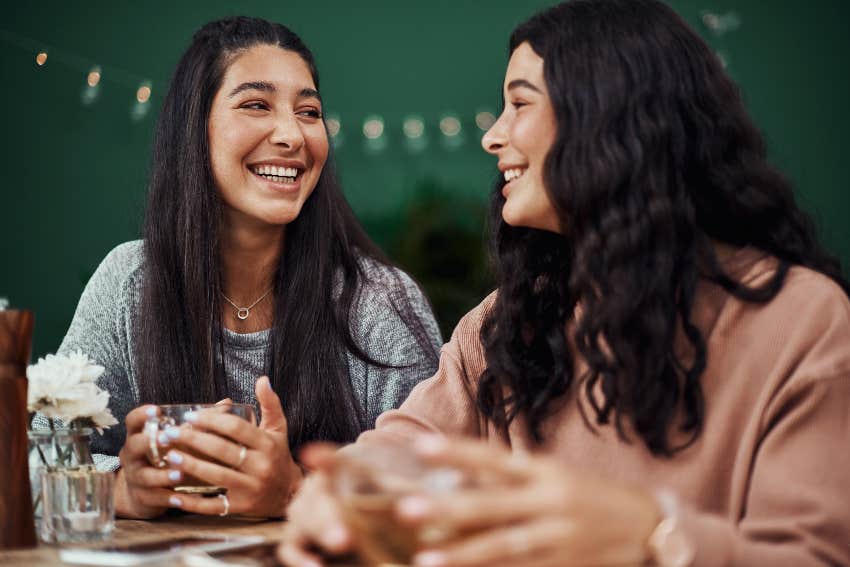Truly Incredible Friends Have These 30 Ride-Or-Die Qualities
Friendships are some of the most important relationships in our lives, so make sure yours is ride-or-die.
 Jack Finnigan | Unsplash
Jack Finnigan | Unsplash Our best friends are the people we depend on to nurture us, comfort us, and energize us, and our interactions with these men and women are life-giving, inspiring, and frankly, make life worth living.
These relationships are founded on some core values and personality traits. There is a wealth of scientific evidence showing just how much of an impact the quality of our friendships has in our lives.
A longitudinal study of aging conducted by Australian researchers found that "greater social networks with friends and confidants had significant protective effects against mortality over a 10-year follow-up period [whereas networks] with children and relatives were not significant predictors of mortality over the same follow-up period."
In a study of dementia in elderly women, researchers found that "larger social networks have a protective influence on cognitive function among elderly women." And yet another study, conducted by neuroscientists at Ohio State University, found that social interaction can potentially decrease pain and increase recovery time in patients dealing with physical pain.
Finding a ride-or-die friend can be difficult, but when you do come across someone you naturally vibe with, there are certain qualities they should have that indicate they are not only in it for the long run, but that they are a truly incredible friend who best complements you.
Truly incredible friends have these 30 ride-or-die qualities:
1. Energetic
A good friend is one you readily and easily connect with. It's almost as if you knew each other from the start, and match one another's energy. The relationship has a sense of ease and comfort that results from this sense of familiarity.
2. Complementary
 Halay Alex / Shutterstock
Halay Alex / Shutterstock
As you get to know each other, you discover that you have shared values and interests in common. Perhaps, you like to do the same things, read the same kinds of books, and watch the same kinds of movies.
You might get up at the same time, like to eat the same kinds of foods, have similar beliefs about life, and child raising, or interest in the same causes.
3. Compassionate
Good friends have a heart for what you’re experiencing. They understand your pain with compassion and support, and they rejoice in your successes. They are your cheerleaders for everyday challenges and achievements.
Having a compassionate friend significantly benefits well-being by fostering strong social connections, reducing stress, enhancing feelings of support, boosting self-esteem, and improving overall mental health.
A 2022 study showed that acts of compassion can even contribute to physical health benefits like faster recovery from illness. A compassionate friend provides a safe space to share vulnerabilities and receive understanding and support, leading to a more positive emotional experience.
4. Observant
A good friend listens with interest and responds supportively to your thoughts, feelings, and ideas. This includes reflecting back, as well as suggesting positive ideas. They are tuned into the conversation when you need to talk, and when you need advice.
5. Open-minded
When your friend hears what you’ve shared, even if — and especially if — it’s something you have uncomfortable feelings about, they respond with acceptance and understanding and avoid judging you. They wait to give suggestions until you’re ready to hear them.
6. Authentic
One of the reasons you feel close to your friend is that you know who this person is. You're open and upfront with each other about all that is important to both of you. While you may not be identical in your interests, you accept and value each other, including your flaws.
According to an article by UC Berkeley, authenticity in a friend is highly beneficial, fostering deeper connection, trust, and overall relationship satisfaction. People feel more comfortable being themselves around someone who is genuinely accurate to their thoughts and feelings, leading to greater intimacy and positive emotional experiences.
7. Trustworthy
This is a person you can rely on. Their behavior is predictable, at least to you, so you know what to expect. They do what they promise and you can always count on them.
8. Humorous
Sharing humor is so important in friendship! When you can laugh about life, you reduce stress and improve your ability to navigate painful moments so you can start to see the humor in them.
We tend to laugh about things that cause us tension or discomfort, so when you laugh with a friend, it suggests that you share similar pain points in your lives and that you understand each other.
9. Honest
You want friends that are honest not only about what they think but who they are. You want friends who understand and hold to their values and promises. For them to be honest wholeheartedly allows you to place your trust in them, even when you don't see eye-to-eye.
Honesty in a good friend is crucial for building strong, trusting relationships, fostering open communication, and promoting overall well-being within a friendship.
Research by Utah State University found that being honest with a friend creates a safe space to share thoughts and feelings without fear of judgment, leading to a deeper emotional connection and stronger bond.
10. Dependable
True friends show up. They consistently are there for you when you need a helping hand or a shoulder to cry on. But they are also there to cheer you on and applaud your success.
They honor their commitments, follow through on their words, and support you when it matters. It means nothing when the friendship is convenient.
11. Good listener
 Yuri A / Shutterstock
Yuri A / Shutterstock
Friends that are good listeners are hard to come by. But you find people who provide space for you to express yourself, inquire about your thoughts and feelings, acknowledge your emotions, and assist you in gaining a fresh perspective, don't ever let them go.
12. Low-maintenance
Some may see this as an insult but, in reality, it makes for a great friend. You don't have to worry if you're busy and can't hang out; they won't hold it against you or create any drama. If you're busy, they understand.
A low-maintenance friend can be beneficial because it reduces stress by having lower expectations for constant contact, allowing for flexibility in the relationship, and providing stability without the pressure to constantly maintain a high level of interaction.
However, a 2023 study found that ensuring that even low-maintenance friendships still involve genuine connection and support when needed is essential.
13. Kind
Kindness often goes unnoticed, but a true friend is amiable, considerate, attentive, and generous. They infuse sincerity into their actions without any expectation of reciprocity. True kindness is a rare thing to find in friends these days, so if you have a truly kind friend, hold tight.
14. Protective
A friend should love you and prioritize your safety and well-being. They should honor boundaries and intervene if someone mistreats them. A good friend will also know how to walk the line of being overprotective and letting you lead your own life.
15. Supportive
While good friends aren't literal cheerleaders, they support you and your accomplishments. They encourage you to keep going, keep getting up when you're down, and keep trying. They are there to cheer you on.
Having a supportive friend significantly benefits mental health by reducing stress, alleviating feelings of loneliness, lowering depression risk, improving self-esteem, and providing a sense of belonging, particularly during challenging times.
A 2023 study explained that strong social connections through close friendships can contribute to overall well-being and resilience across the lifespan.
16. Empathetic
You will be so grateful to find friends who can step into your shoes and make a sincere effort to see the world through your eyes. These friends go above and beyond to fully understand your thoughts and feelings. A friend who can genuinely empathize with you is a rare treasure to find.
17. Unique
True friends aren't here to imitate you. They are their selves in this friendship. They have unique identities that complement and possibly amplify aspects of both of you that may have otherwise remained unnoticed.
The best type of friendships will also recognize the importance of occasionally taking time apart to express themselves as individuals.
18. Adventurous
Good friends are adventurous in that they like to do things, think things, feel things, and share things with you. This doesn’t necessarily mean they're adrenaline junkies who want to convert you; rather, they wish to try new experiences with you. The desire and willingness to experience the world is an inseparable part of friendship.
According to research from the American Psychological Association, having an adventurous friend can significantly benefit your well-being by encouraging you to step outside your comfort zone, fostering stronger bonds through shared experiences, building resilience, enhancing personal growth, and providing opportunities for new learning and discovery, all while promoting positive emotions like excitement and accomplishment. Respecting each other's comfort zones and boundaries when engaging in adventurous activities is crucial.
19. Nurturing
A true friend is there to help you in your messiest moments, like holding your hair back when you aren't feeling your best. However, they also ensure you're taking care of yourself, encouraging you to eat well, get proper rest, and eagerly listen as you share your latest achievements and newfound aspirations.
20. Respectful
A friend should show respect for your passions, your fears, and the things you prefer to avoid. Without this fundamental respect, a friendship can devolve into nothing more than a reflection of one's narcissism, viewing the other person merely as an extension of oneself until they no longer serve a purpose.
21. Forgiving
Surround yourself with friends who have an unwavering commitment to forgive you when you make mistakes, especially mistakes that affect them. A good friend doesn't hold grudges; they love you wholeheartedly and understand that we are all human.
Practicing forgiveness towards a good friend can significantly benefit the relationship by fostering stronger bonds, reducing negative emotions like anger and resentment, improving communication, and promoting overall well-being for both individuals involved. Research by Harvard Health explained that forgiveness can create a safe space for open and honest communication, allowing friends to address issues constructively.
22. Loyal
 Yuri A / Shutterstock
Yuri A / Shutterstock
Good friends are loyal and stand by your side through thick and thin. They are there for you in good times and bad, without wavering. They won't pick sides or throw you under the bus.
23. Resilient
Good, true friends can weather the ups and downs of life's challenges and remain steadfast in their friendship. In moments of difficulty, a true friend doesn't shy away or distance themselves; instead, they draw closer, ready to offer assistance in any way they can.
This quality in a friendship is what strengthens the bond and builds a foundation of trust that can withstand the tests of time and adversity.
24. Generous
Good friends are generous with their time, resources, and affection. They will listen to you and comfort you when times are tough. They will always be there to reassure and empathize with you whenever necessary. Friends should also want to see you thrive and feel loved.
According to research by Harvard Business School, having a generous friend can significantly benefit your well-being. Generosity from friends often triggers positive emotions like happiness, increased feelings of connection, and a sense of belonging while potentially reducing stress and boosting self-esteem. While generosity is essential, a healthy friendship involves a balance where both individuals feel comfortable giving and receiving support.
25. Patient
True friends are patient, especially when you're going through challenging times or making important decisions. They respect your timing and never push you to make a decision or shove you in a certain direction. Instead, they give you the space to make your own decision and wait patiently as you do so.
26. Optimistic
A good friend possesses the ability to see the silver lining in even the most challenging situations. Their optimism is their superpower. It can uplift your spirits and add hope to your life when you need it most.
27. Consistent
Having a friend who maintains a consistent level of support is like having an anchor in a turbulent sea. They provide stability and reliability when things become uncertain or challenging. You will always be able to count on their support and love.
Consistency in a friend is highly beneficial, as it fosters trust, reliability, and a strong sense of security. An APA article found that this ultimately leads to deeper, more positive friendships and improved individual well-being. Knowing you can depend on a friend to be there for you in a predictable way is crucial for building strong bonds and feeling supported.
28. Humble
A humble friend fosters an environment where others can comfortably share their dreams without fear of judgment. They can create a space where everyone can shine in their unique way. A humble friend is a good friend.
29. Flexible
Good friends recognize that life is dynamic, and sometimes life can threaten to pull people apart. However, these friends make a conscious effort to ensure that the bonds of friendship remain unbreakable.
They are not only willing to adjust to each other's changing circumstances but are happy to do so. They don't argue, hold a grudge, or get dramatic. Rather, they understand that life happens and don't hold you responsible for it.
30. Selfless
Whether you're facing a challenging situation, dealing with a personal crisis, or simply need someone to talk to, they're there, offering their support without hesitation. This willingness to set aside their priorities and be present for you in your moments of vulnerability is a true mark of their devotion to your friendship.
Dr. Sharon Livingston is a career coach, world-class researcher, and best-selling author. Her work has been featured in The New York Times, The Washington Post, The Daily News, Newsday, The New York Post, Business Week, and many more.

